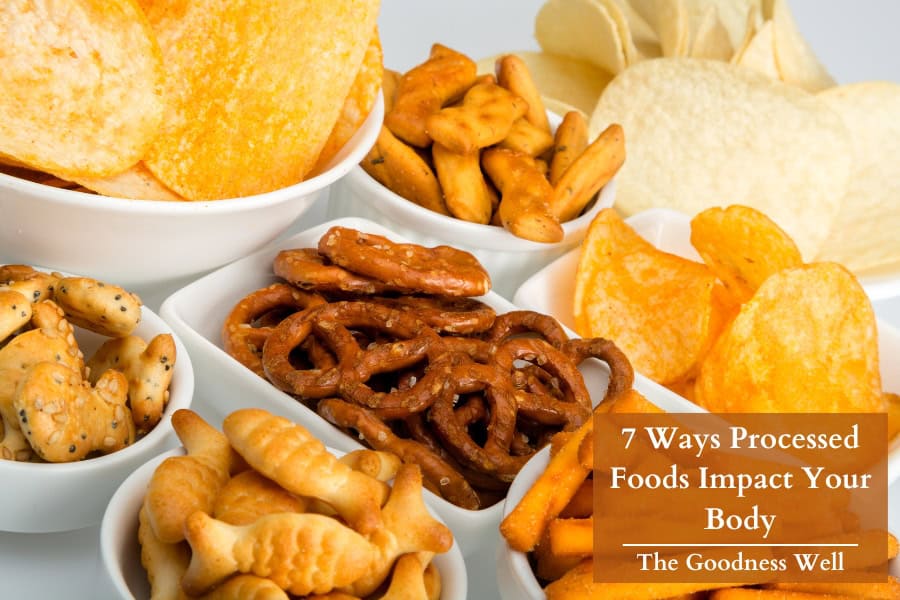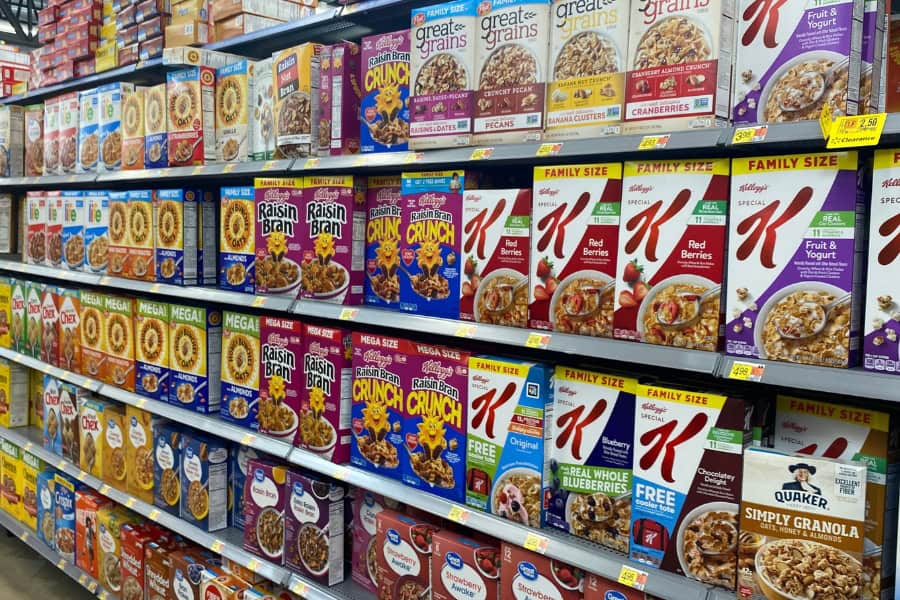7 Ways Processed Foods Impact Your Body

On average, Americans get 60% of their calories from processed foods.
…And we wonder why we have an obesity and chronic illness epidemic.
Those convenient, nicely packaged snacks and ready-made meals we love are doing more harm than good.
We’re diving into how processed foods affect our bodies. From sugar spikes to mood swings, you’ll learn why that bag of chips might be more trouble than it’s worth.
TL;DR
Processed foods, specifically ultra-processed foods like foods high in added sugar, carbohydrates, sodium, and artificial additives can lead to serious health issues that can have long-term effects on your body such as weight gain, risks for chronic disease, nutrient deficiency, digestive issues, inflammation, blood sugar spikes, and mental health issues.
What Are Processed Foods?
Processed foods are any foods that have been altered from their natural state for safety reasons or for convenience.
However, there’s a difference between minimally processed foods and those ultra-processed foods that dominate so much of our modern diet.
Minimally processed foods are your basic prepped ingredients. Think washed and chopped veggies, roasted nuts, or maybe even bagged salad mixes. These aren’t too far removed from their natural state and can actually be healthy.

On the flip side, ultra-processed foods have been heavily modified and often contain a laundry list of dangerous ingredients. This includes stuff like packaged snack cakes, frozen pizzas, or those “cheese products” that seem to last forever in your fridge.
Here are some of the most common processed foods:
- Sugary Snacks: Candy, cookies, cakes, and pastries.
- Soda and Sweetened Beverages: Soft drinks, energy drinks, and sweetened teas.
- Packaged Snack Foods: Chips, crackers, and pretzels.
- Processed Meats: Bacon, sausages, hot dogs, and deli meats.
- Frozen Meals: TV dinners, frozen pizzas, and microwavable entrees.
- Breakfast Cereals: Many boxed cereals, especially those with added sugar.
- Instant Noodles and Soups: Ramen noodles and canned soups.
- Bread and Baked Goods: White bread, hamburger buns, and store-bought muffins.
- Condiments and Sauces: Ketchup, mayonnaise, salad dressings, and BBQ sauce.
- Fast Food: Burgers, fries, and fried chicken from fast-food chains.
Humans have been processing food for thousands of years. It all started with simple techniques like fermenting, salting, and drying to preserve food and make it last longer.
As time went on, we got more sophisticated with our food processing techniques. The Industrial Revolution brought us canning and pasteurization. Then came freezing, and before you knew it, TV dinners were all the rage.
Processed foods are everywhere these days, from the snacks we grab on the go to the quick meals we heat up at home. They may be convenient, but like most things made to be convenient, they come with a cost. Let’s get into what exactly this “cost” is.
1. Weight Gain and Obesity
The most obvious effect of eating processed foods is weight gain.
Processed foods are loaded with added sugars, unhealthy fats, and empty calories, which make them hard to resist.

These foods are designed to taste good and even be addictive, but they can quickly lead to weight gain.
This food is not meant to satisfy your hunger but only make you want more and more which means you end up eating a lot of food that doesn’t really fill you up, and you find yourself wanting and craving more.
The excessive consumption of processed foods can even disrupt your body’s natural hunger signals.
The high amounts of sugar can cause rapid spikes and crashes in blood sugar levels, leading to increased cravings and a constant cycle of hunger and overeating.
The unhealthy fats, often found in these foods, can contribute to inflammation and metabolic issues, causing issues with weight management and your overall health.
2. Increased Risk of Chronic Diseases
According to the National Institute of Health, eating a lot of processed foods is linked to diseases like heart disease, type 2 diabetes, and even certain cancers.
Processed foods are so bad for you and so heavily linked to chronic disease, that it’s estimated that “Today, eating processed foods and fast foods may kill more people prematurely than cigarette smoking.”…
3. Nutrient Deficiency

When foods are processed, they lose a lot of the good stuff like vitamins, minerals, and fiber.
They’re stripped away of everything that makes them nutritious. This can lead to nutrient deficiencies because you’re missing out on the essential things your body needs to function properly.
For example, the lack of fiber and other nutrients, such as vitamin D and iron, in processed foods can lead to digestive problems, gut health issues, decreased energy levels, and other health concerns.
Over time, relying on such foods can impair overall health and increase the risk of chronic conditions like heart disease and diabetes.
4. Digestive Issues
Processed foods often lack fiber, which is crucial for good digestion.
Without enough fiber, you can end up feeling bloated, constipated, or uncomfortable.

Those artificial additives and preservatives found in ultra-processed foods can mess with your gut and make these problems even worse.
These additives may interfere with the natural microbiome, which is crucial for digestion, nutrient absorption, and immune function. An out-of-whack microbiome can increase inflammation and contribute to systemic health problems, making things like fatigue and metabolic disorders even worse.
5. Increased Inflammation
Processed foods can also cause inflammation in your body because they contain high levels of sugars, unhealthy fats, and artificial additives that trigger an inflammatory response.
This is your body’s way of signaling that it’s reacting to something harmful or abnormal, much like how a fire alarm alerts you to smoke.

When inflammation becomes chronic, it persists over time rather than resolving quickly. This ongoing, low-level inflammation acts like a persistent, smoking fire inside your body, contributing to damage and dysfunction.
Chronic inflammation has been linked to a variety of serious health issues, such as arthritis, where it causes joint pain and swelling; heart disease, where it can contribute to plaque buildup in arteries; and Alzheimer’s disease, where it may damage brain cells and impair cognitive function.
In short, these types of foods can cause significant inflammatory issues all over your body.
6. Negative Impact on Mental Health
While mental health challenges can come from many different areas of our lives, our diet is the most overlooked culprit.
Believe it or not, what you eat can affect how you feel mentally.

Diets high in processed foods have been linked to depression, anxiety, and other mental health issues.
Ironically the name for the way most Americans eat is the S.A.D.(Standard American Diet) diet.
The SAD diet also known as the Western Diet is known for its high amounts of processed foods, refined carbohydrates, and saturated fats, and low intake of plant-based foods
Dr. Joel Fuhrman writes in the National Library of Medicine, “Many people recognize that junk food, fast food, processed food, white flour, sugar, maple syrup, honey, agave nectar, and all the junk people are eating contribute to obesity, diabetes, heart attacks, strokes, dementia, and cancer, but many don’t realize the strong causative role an unhealthy diet may have in mental illness. Currently, 1 in 5 Americans suffers from a psychiatric disorder.”
7. Blood Sugar Spikes and Insulin Resistance
Because processed foods have a high amount of carbohydrates and sugar they are notorious for spiking your blood sugar.
Because the refined carbohydrates in ultra-processed foods are digested quickly, they cause a rapid increase in blood sugar levels.
And on top of that, the added sugars can have the same effect of quickly raising your blood sugar levels.

When your blood sugar spikes, your body has to produce more insulin (a hormone that helps lower blood sugar) to manage these spikes. Over time, your cells can become less responsive to insulin, meaning it becomes less effective at lowering your blood sugar. This condition is called insulin resistance.
If insulin resistance continues unchecked, your body will struggle to keep blood sugar levels in a healthy range, which can eventually lead to type 2 diabetes.

Processed foods might be convenient, but they can take a big toll on your health. From weight gain to nutrient deficiencies, and even serious diseases, these foods are not doing your body any favors no matter how convenient they may seem.
Choose whole, unprocessed foods as much as possible. You can even try finding healthy snack versions of the food you already love.
Pro tip: Focus your shopping on where the fresh produce and meat sections are located instead of in the main aisles.
Perfection isn’t the goal but mindfully eating is.
Thank you for reading! I hope this brought clarity and understanding on how processed foods can affect your health. ❤️






